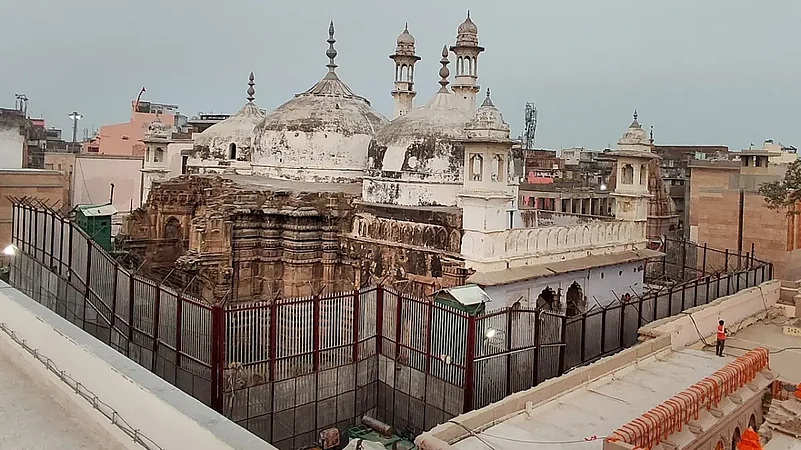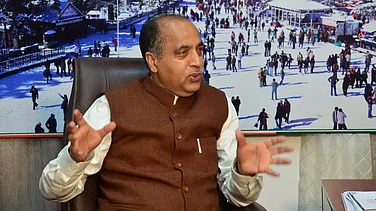A district court in Uttar Pradesh on Tuesday fixed May 26 for hearing on the maintainability of the Gyanvapi-Shringar Gauri complex case.
The court of District Judge A K Vishevesh will hear the matter as per directions of the Supreme Court, District Government Counsel Rana Sanjeev Singh said.
Singh said the court also gave a week's time to both Hindu and Muslim sides to file objections to the report of a court-mandated videography survey of the Gyanvapi mosque premises.
Vishnu Shankar Jain, a lawyer for the Hindu side, said the civil judge listed for May 26 the hearing on a plea of the Muslim side, which said the suit doesn't have merit as it violates the Places of Worship (Special Provisions) Act, 1991.
Section 4 of the Act bars filing of any suit or initiating any other legal proceeding for a conversion of the religious character of any place of worship, as existing on August 15, 1947.
Jain said the court ordered to make available the commission report to both sides for filing objections.
Meanwhile, a fresh application was filed in the court of Civil Judge (Senior Division) Ravi Kumar Diwakar, seeking permission to worship the "Shivling" claimed to have been found in the Gyanvapi complex during the videography survey.
The plea, filed on behalf of the Vishwa Vedic Sanatan Sangh, also sought a ban on the entry of Muslims to the complex.
Sangh's president Jitendra Singh Bisen said the writ has been filed by his wife Kiran Singh and organisation's general secretary.
Bisen said the court has admitted the writ and on their request agreed to conduct a hearing Wednesday on the third aspect--permission to offer prayers at Shivling.
A court order also confirmed that the matter has been listed for Wednesday.
A similar petition was moved by Dr Kulpati Tiwari, Mahant of the Varanasi's Kashi Vishwanath temple, on Monday for regular "pujan" (worship) of the Shivling.
The apex court had on Friday transferred the Gyanvapi-Shringar Gauri complex case from a civil judge (senior division) to a district judge, saying looking at the "complexities" and "sensitivity" of the issue, it is better if a senior judicial officer having an experience of over 25-30 years handles this case.
The district judge court had on the previous day reserved its order on which prayer should be heard first.
The Hindu side argued that since a court-appointed commission has completed its survey work, the opponents should present their objections to it.
Anjuman Intezamia Masjid Committee's lawyer Mohammad Tauhid Khan had argued that the writ is not maintainable under Order 7 and Rule 11 of the Civil Procedure Code, hence, it should be dismissed.
On May 16, the lower court had directed the district administration to seal a spot in the Gyanvapi Masjid complex after counsels representing the Hindu petitioners said a Shivling was found during a court-mandated videography survey.
A mosque management committee spokesperson disputed the claim, telling a television channel that the object was part of a "fountain".
He said lawyers representing the mosque committee were not fully heard before the sealing order was announced.
The Hindu side claimed that the Shivling was found close to the "wazookhana"--a small reservoir used by Muslim devotees to perform ritual ablutions before offering the namaz.
Here is a brief history of the case
Petitioner: The petitioner says that the self-styled Jyotirling of Lord Vishwanath in Kashi (Varanasi in Uttar Pradesh) is in the Gyanvapi complex. The petitioner also claimed Mughal Emperor Aurangzeb had destroyed a portion of the Kashi Vishwanath temple in 1669 and built a mosque named Gyanvapi Masjid. The petitioner wants the court to declare that Muslims have no right to occupy the Gyanvapi Masjid site and their entry should be barred.
Defence: The defence says that there was no temple in the Gyanvapi complex and the mosque is standing on the site from the very beginning.
Here we look at the timeline of events in Kashi Vishwanath Temple-Gyanvapi Mosque Complex case that is making headlines again.
Timeline:
In 1991, the first petition in the case was filed in Varanasi court by Swayambhu Jyotirlinga Bhagwan Vishweshwar. The petitioner had sought permission to worship in Gyanvapi complex.
He had placed three demands before the court including that the court should declare the entire Gyanvapi complex as a part of the Kashi temple.
Besides, he also sought eviction of Muslims from the complex area and also sought mosque in the complex to be demolished. The petitioner had also pleaded before the court that Hindus should be given permission to rebuild the temple.
In 1998, Anjuman Intezamia Masjid Committee filed a case at the Allahabad High Court. The committee in their plea before the court asserted that the temple-mosque land dispute could not be adjudicated by a civil court as it was barred by the law. It was on the directions of the high court that the proceedings in the lower court got stayed which continued for the past 22 years.
In 2019, a person named Rastogi filed a plea on behalf of Swayambhu Jyotirlinga Bhagwan Vishweshwar in Varanasi district court. The petitioner demanded that an archaeological survey of the entire Gyanvapi mosque complex should be carried out. In his plea, the petitioner mentioned himself as the "next friend" of Swayambhu Jyotirlinga Bhagwan Vishweshwar.
In 2020, Anjuman Intezamia Masjid Committee opposed the petition seeking ASI survey of the entire Gyanvapi complex. In the same year, the petitioner again approached the lower court with a petition, requesting to resume the hearing as the Allahabad High Court had not extended the stay further.
Now, the court is hearing a petition by five Hindu women seeking daily prayers before the idols on the mosque's outer wall. Following the survey and the reported finding of a shivling inside the complex, the court has now ordered the spot in the complex to be sealed.
(With PTI inputs)


















.png?w=200&auto=format%2Ccompress&fit=max)







